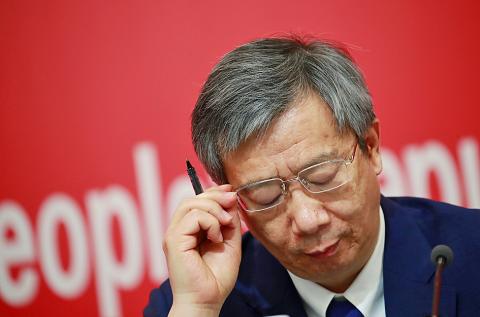China is not in a rush to add massive monetary stimulus, in contrast with other central banks around the world, and must maintain a prudent policy stance, People’s Bank of China (PBOC) Governor Yi Gang (易綱) said yesterday.
Overall financial risks are contained and those in the shadow banking sector and some key institutions have been resolved, said Yi, speaking at a joint briefing in Beijing with Chinese Minister of Finance Liu Kun (劉昆) and National Bureau of Statistics Director Ning Jizhe.
Even as China grapples with growth on pace for the slowest expansion in almost 30 years, policy makers are holding back from all-out stimulus as they continue efforts to rein in financial risks. That is in contrast to central banks such as the US Federal Reserve and the European Central Bank, which are either cutting borrowing costs further or flagging a willingness to do so.

Photo: EPA-EFE
“Chinese officials remain determined to avoid quick and easy reflation,” said Frederic Neumann, cohead of Asian economics research at HSBC Holdings PLC in Hong Kong. “Interest rates may still need to come down in the coming months to cushion the slide in growth. Anyone expecting a sharp Chinese growth bounce, however, may be disappointed.”
Interest rates are appropriate and the central bank has ample monetary policy tools, the PBOC said in a statement ahead of the briefing, reiterating its policy stance.
Inflation remains relatively moderate and the central bank will remain patient, Yi said.
“We are not in a rush to roll out massive rate cuts or QE [quantitative easing] like some other central banks,” he said.
China’s actual tax cuts will be larger than expected this year, while the manufacturing and private sectors are the biggest beneficiaries of those cuts, Liu said.
The government in March announced tax cuts of 2 trillion yuan (US$281 billion) for the year as part of what it described as the largest ever fiscal stimulus plan for the nation.
Infrastructure spending is accelerating and the key is to ensure capital from all sources is put to good use for the projects, Ning said.
The PBOC cut the amount of cash banks must hold as reserves this month to the lowest level since 2007, although it is still holding off on cutting borrowing costs more broadly.
While the central bank has tweaked policies in recent months to support the slowdown, it has refrained from more aggressive stimulus out of concern over financial stability and high debt levels.
“Beijing seems deeply concerned that another round of large-scale credit easing could trigger a systemic financial crisis,” said Lu Ting (陸挺), chief China economist at Nomura International Ltd in Hong Kong.
“A new master plan has become increasingly evident that features no flood of credit, targeted credit easing and rate cuts that exclude the property sector,” Lu said.

Intel Corp chief executive officer Lip-Bu Tan (陳立武) is expected to meet with Taiwanese suppliers next month in conjunction with the opening of the Computex Taipei trade show, supply chain sources said on Monday. The visit, the first for Tan to Taiwan since assuming his new post last month, would be aimed at enhancing Intel’s ties with suppliers in Taiwan as he attempts to help turn around the struggling US chipmaker, the sources said. Tan is to hold a banquet to celebrate Intel’s 40-year presence in Taiwan before Computex opens on May 20 and invite dozens of Taiwanese suppliers to exchange views

Application-specific integrated circuit designer Faraday Technology Corp (智原) yesterday said that although revenue this quarter would decline 30 percent from last quarter, it retained its full-year forecast of revenue growth of 100 percent. The company attributed the quarterly drop to a slowdown in customers’ production of chips using Faraday’s advanced packaging technology. The company is still confident about its revenue growth this year, given its strong “design-win” — or the projects it won to help customers design their chips, Faraday president Steve Wang (王國雍) told an online earnings conference. “The design-win this year is better than we expected. We believe we will win

Chizuko Kimura has become the first female sushi chef in the world to win a Michelin star, fulfilling a promise she made to her dying husband to continue his legacy. The 54-year-old Japanese chef regained the Michelin star her late husband, Shunei Kimura, won three years ago for their Sushi Shunei restaurant in Paris. For Shunei Kimura, the star was a dream come true. However, the joy was short-lived. He died from cancer just three months later in June 2022. He was 65. The following year, the restaurant in the heart of Montmartre lost its star rating. Chizuko Kimura insisted that the new star is still down

While China’s leaders use their economic and political might to fight US President Donald Trump’s trade war “to the end,” its army of social media soldiers are embarking on a more humorous campaign online. Trump’s tariff blitz has seen Washington and Beijing impose eye-watering duties on imports from the other, fanning a standoff between the economic superpowers that has sparked global recession fears and sent markets into a tailspin. Trump says his policy is a response to years of being “ripped off” by other countries and aims to bring manufacturing to the US, forcing companies to employ US workers. However, China’s online warriors